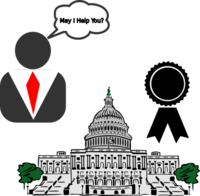Quality of public administration
| Quality of public administration |
|---|
| See also |
Quality of public administration is defined by the degree of meeting customer needs. The client is the final and ultimate verifier of service quality. It can be concluded that customer satisfaction is certainly the most important factor in services. Customers of public administration are all citizen of a country or region, which assess quality of services provided by the state.
It should be noted that there is a relationship between the needs, expectations and satisfaction. Needs create expectations, based on perception, as well as on direct experience. If the needs and expectations are properly understood, the actions taken up adequate and realistic expectations, which have the target of closing the gap between expectations and experience.
The services provided by public administration
Formation and assessment of quality of public administration services include:
- type of service,
- level of emotional involvement,
- attitude to the rulings of administration,
- level of knowledge about public administration services,
- local taxes and fees,
- standards of service described in law and actually provided.
Quality of service in public administration also depends on:
- economic factors,
- social factors,
- organizational and legal factors,
- technical and environmental considerations.
Organizational culture present in public administration offices plays a key role. It is an indispensable part of quality awareness, the ability to think for the benefit of external customers. Continuous quality improvement can undoubtedly contribute to a lasting change in culture.
In the public administration, we can distinguish three levels of the development of quality services:
- normative level relating to the development of detailed procedures for quality
- effective level involving the study of effectiveness and efficiency of the quality system,
- satisfactory level guarantees high quality of services.
Quality management in public administration
We should pay special attention to the quality management, which is a set of interrelated and interacting processes. In many offices, the problem is poor information flow, slow flow of documents and poor cooperation between organizational units. Frequently it can be observed in the absence of a proper leadership, leading to autonomization of the organizational objectives. With the use of electronic tools, the many good offices can cope with this phenomenon.
Effective government action is vital, but should also be strengthened by addressing the interests of the general public. A new concept, which relates to the functioning of public administration in modern times, is called ethical management. Well, it largely to rebuild public confidence in the state, its elites and public administration. Confidence to public administration nowadays is reduced. Rebuilding it will be possible through the cooperation of politicians and officials.
Nowadays, more important than gaining a competitive advantage is to achieve customer satisfaction. It is extremely important for the administration and even in the literal sense, it has not competition. Thanks to his professionalism, it may contribute to the confidence of citizens, while in the case of local administration - support the local community by building its competitive advantage (e.g., attracting investment, fund-raising assistance, increase the legal awareness of citizens). The administration needs to move away from the concept of "doing business" in the direction of solving problems. Effectiveness and efficiency of the public sector should learn from business. But keep in mind that the success and credibility of the administration, can not be measured by the same standard, which are measured to achieve commercial objectives.
See also:
References
- Donnelly M., Wisniewski M., Dalrymple J.F., Curry A.C. (1995) Measuring service quality in local government: the SERVQUAL approach, International Journal of Public Sector Management, Vol. 8 Iss: 7
- Mulgan, R. (2000). ‘Accountability’: An Ever‐Expanding Concept?. Public administration, 78(3), 555-573.
- Osborne D. (1993) Reinventing Government, Public Productivity & Management Review, Vol. 16, No. 4
- Sanderson I, (2001) Performance Management, Evaluation and Learning in Modern Local Government, Public Administration, 79(2)
Author: Ewa Sak
